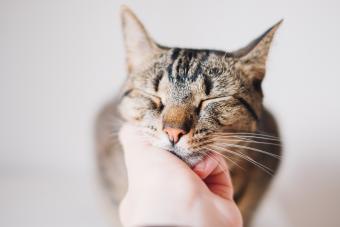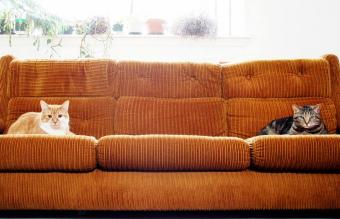
One behavior that cat owners find particularly strange is their fascination with plastic bags. Some cats just love to roll around and pounce on them, while others will lick and try to chew on them. If you wonder why your cat eats plastic, there's actually a number of reasons for this behavior.
Why Does My Cat Eat Plastic?
If your situation involves a cat eating plastic and actually ingesting pieces of it, this is probably pica. Pica is a condition where your cat has a compulsive need to eat things that are not edible.
What Causes Pica in Cats?
Pica can develop due to medical problems like hyperthyroidism or feline leukemia. It can also be brought on by behavior problems like anxiety. If your cat has pica, your veterinarian can do a full physical exam and, if it's medical, treat the underlying disease. If it's related to stress, your veterinarian can prescribe anxiety medication such as fluoxetine and clomipramine.
Will Some Cat Breeds Eat Plastic More Than Others?
There's a genetic component to pica that causes it to show up more often with certain breeds. These breeds are Siamese, Burmese, Oriental, and Tonkinese cats. This doesn't mean that any breed or mixed breed of cats can't get pica, but only that these specific breeds tend to develop the condition more than others.
Why Does My Cat Lick Plastic?
Cats that lick plastic bags for groceries will often do it because it smells like food or has actual food residue on it. Cats have a very sensitive sense of smell, so they can tell where food was even if the bags are empty now.
Corn Starch and Lanolin Oil
Cats aren't just drawn to the smell of food on bags. They can also be attracted to the substances used to make plastic bags. Many plastic bags are made with corn starch or coated with lanolin oil, which a cat will find very tasty and may cause them to lick plastic bags intently.
Poor Dietary Nutrition
Another reason cats may eat or lick plastic is if there's a deficiency in their diet. If a cat is lacking certain nutrients in their diet, or fiber, you may notice them eating many things that are inappropriate, such as their kitty litter and plants. Your cat is basically testing other items to try to fulfill its dietary needs. Changing your cat's diet or adding in a multivitamin or nutritional supplement may eliminate this behavior.

Why Does My Cat Chew on Plastic?
Some cats will not actually eat or lick plastic but they will appear to chew on it without trying to ingest it. This can be related to the taste of the plastic but many times is simply due to boredom on the cat's part.
Boredom and Stress
Cats that are bored or feel anxious may play with or chew plastic bags to give themselves something to do and make themselves feel calmer. In some cases, this stress can lead to a case of obsessive compulsive disorder (OCD) which will require medication. If your veterinarian cannot find a medical reason for your cat eating plastic, try giving your cat more things to do.
Plastic Is Fun
Another reason you may see your cat entertaining themselves with plastic bags is simply that they're lots of fun. Cats are attracted to the type of crinkly and crunchy noises that bags make. They may also get excited by the movement of the bag because it elicits their innate prey drive, just as a shiny, crinkly cat toy would. They may end up chewing, licking, or even eating the bags during an energetic play session.
Dental Disease
Occasionally a cat will chew on plastic because it makes their teeth and gums feel better. This is related to dental problems such as periodontitis, gingivitis, and tooth resorption, which are very common in cats. If your cat has other symptoms, such as bad breath, trouble eating, or drooling, and their gums look red and irritated, it's time for a trip to the veterarinarian for a dental exam.
Safety and Prevention for Cats Who Like to Eat Plastic Bags
If your cat is eating, chewing or licking plastic bags, the first step is a trip to the veterinarian to make sure your cat isn't sick. If all is medically well, then you need to follow a two-step process.
Manage Your Cat Around Plastic Bags
The first step involves being diligent about removing your cat's ability to get a hold of any plastic items and promptly disposing of plastic grocery bags. If you recycle them, put them in a place your cat can't get to, such as inside a cupboard. This step is critical as chewing or playing with plastic bags puts them at risk of choking or suffocating. Be diligent about not leaving plastic bags on the floor or on tables or counters your cat can get to. Another environmentally friendly option is to buy reusable canvas grocery bags and do away with plastic bags altogether.
Redirect Your Cat Away From Plastic Bags
The next step is giving your cat an alternative activity that's fun for him and keeps him safe. Some possible options you can add into your cat's daily routine include:
-
Foraging toys stuffed with their meals stimulate natural behaviors in cats/
-
Cat trees and perches can increase your cat's physical exercise and mental stimulation if placed by windows.
-
Interactive toys allow your cat to entertain themselves when you're not home or busy.
-
Playing with your cat regularly can also up their exercise and make them feel better.
-
Get him more physical exercise by leash training him and taking him for walks.
-
If your cat continues to have a need to chew things, provide him with safe items for chewing such as Nylabones, soft animal chews, or cat grass.
Don't Allow Your Cat to Eat Plastic
While it may seem cute to let your cat play with plastic bags and chew on them, this can be a serious health risk for your cat. Talk to your veterinarian about whether your cat is doing this because of a medical condition, dietary imbalance, or just simple boredom and fascination with bags. It's easy to keep your cat safe and entertained by creating a process involving keeping bags out of their reach and giving them alternate fun activities.







